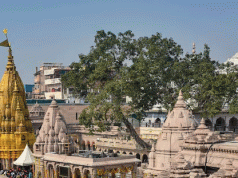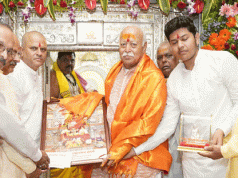
In a significant change to the rituals and practices at the Ayodhya Ram Mandir, the Shri Ram Janmabhoomi Teerth Kshetra Trust has introduced new guidelines that prohibit priests from applying tilak (sandalwood paste) on devotees’ foreheads and distributing Charanamrit (holy water) in exchange for dakshina. Effective immediately, any offerings given to priests must be placed in a designated donation box told the trust.
The directive, which Chief Pandit Acharya Satyendra Das has confirmed, aims to streamline and regulate the practices within the Mandir’s Garbhagriha (sanctum sanctorum). Pujaris have expressed dissatisfaction with this decision yet are prepared to comply with the Trust’s orders.
Since the grand inauguration of the Mandir on January 22, the Mandir has witnessed an influx of devotees from across the country. Devotees are keen not only to see Bhagwan Shri Ram but also to engage in close worship. To manage the large number of visitors, the Trust has issued various guidelines, but many devotees still aspire to get a closer darshan (viewing) of Ram Lalla.
Ordinary devotees must stand in queues within barricades to view Ram Lalla. In contrast, those granted VIP darshan privileges are allowed a closer view of Ram Lalla. Previously, after this closer darshan, pujaris would apply chandan (sandalwood paste) to the devotees’ foreheads and offer them Charanamrit. This practice often led to devotees giving donations directly to the pujaris, which supplemented their income beyond their regular salaries.
The Trust’s new directive is to centralise donations and ensure that all offerings are properly accounted for. Chief Pandit Acharya Satyendra Das informed that Trust member Dr Anil Mishra had instructed the priests to cease applying sandalwood paste and distributing Charanamrit. Additionally, any donations from devotees are to be placed in the donation box rather than kept by the pandits.
The Garbhagriha operates with a team of about two dozen pandits, including the Chief Pandit. These priests work in shifts to manage the Mandir’s rituals and ceremonies. The Trust pays the Chief Priest a monthly salary of 35,000, while assistant priests receive 33,000. This structured compensation ensures fair remuneration for all priests involved in the Mandir’s operations.
Although the priests have expressed unhappiness with the new guidelines, they agreed to follow the Trust’s decision. Acharya Satyendra Das emphasised that the Trust’s decisions are collective and must be adhered to to manage the Mandir properly.
Dr Anil Mishra, a member of the Trust, clarified that the decision to prohibit the application of sandalwood paste and the distribution of Charanamrit was not made individually but was a collective decision by the Trust. He stressed the importance of adhering to the guidelines for maintaining order and ensuring that the practices at the Mandir align with the Trust’s objectives.
As the Mandir continues to attract large numbers of devotees, implementing these new guidelines is seen as necessary to maintain the sanctity and order within the Mandir premises. The Trust remains committed to ensuring a smooth and devout experience for all visitors while upholding the traditions and values of the Ayodhya Ram Mandir.














